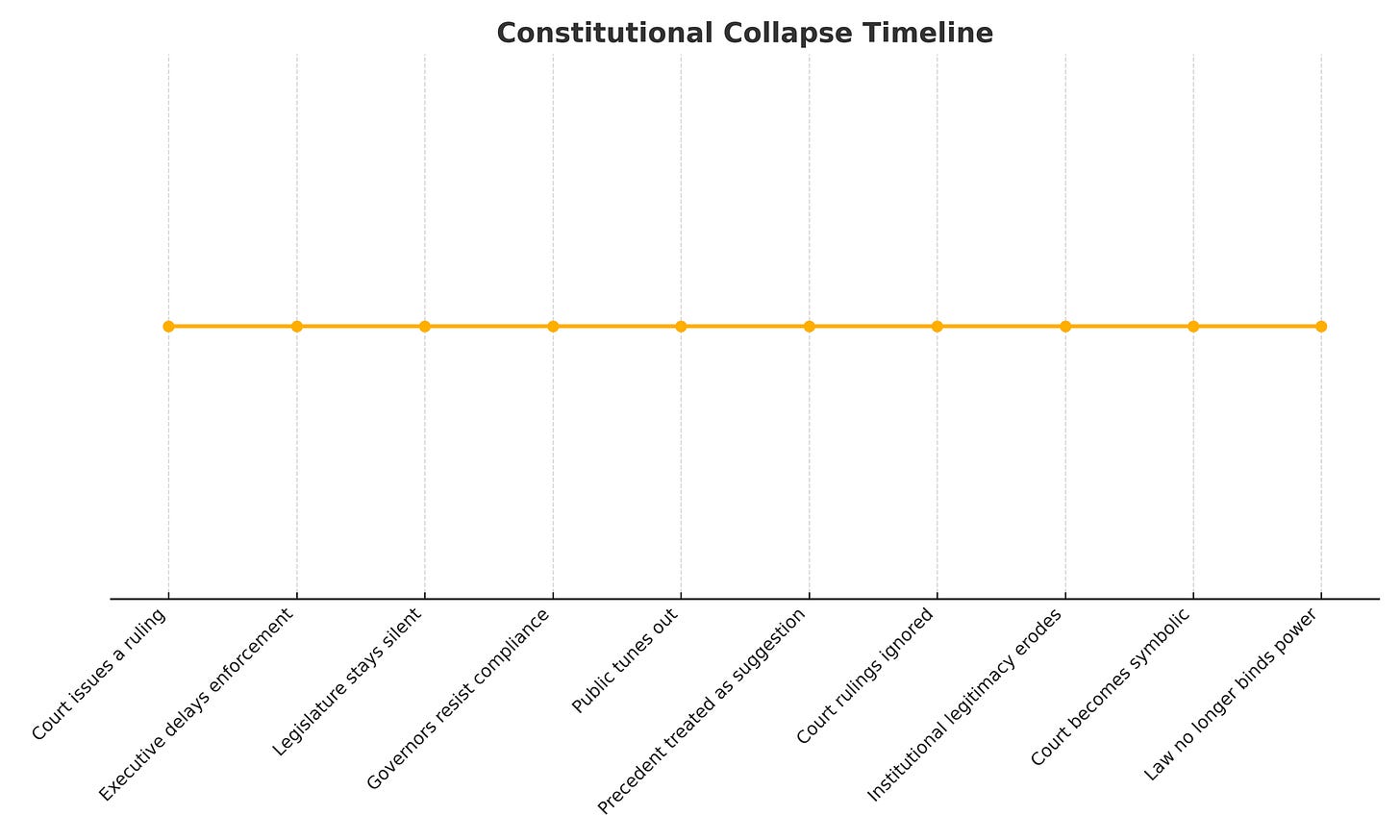The Supreme Illusion: When Judgment No Longer Commands Power
Why the Supreme Court’s Rulings No Longer Matter—And What That Means for the Rest of Us
By: Dino Alonso
1. We’re Not a Republic Anymore—We’re Just Pretending
Imagine a country where the highest court’s decisions are met with shrugs.
Where governors say, “Let them rule—we’ll do as we please.”
Where a president breaks the law, and nothing happens.
This isn’t a dystopian prediction. This is the slow decay you’re living through.
And the most alarming part?
We still pretend this is normal.
The Supreme Court is supposed to be the final word in our constitutional system. But that belief is now a superstition—repeated more out of habit than conviction. The Court has no troops. No budget. No enforcement wing. It survives entirely on the obedience of others.
And those “others”? They're done pretending, too.
2. The Judiciary: Powerful in Word, Powerless in Deed
Alexander Hamilton called the judiciary the “least dangerous branch.” It commands neither the sword nor the purse—only judgment.
But in the modern American context, that’s not a virtue. It’s a weakness.
Interpretation means nothing without enforcement. Judgment without execution is philosophy, not governance. The Court makes decisions but cannot make anyone act on them.
That responsibility rests on the Executive—the president. And if the president refuses?
We are left with a scroll of words. Powerless. Toothless. A legal opinion floating in a vacuum.
3. History Doesn’t Repeat, But It Rhymes Like Hell
We’ve seen this before—power ignoring principle.
The Court sided with the Cherokee Nation in Worcester v. Georgia (1832). President Andrew Jackson, in a moment of tyrannical bravado, is said to have replied:
“John Marshall has decided; now let him enforce it.”
He didn’t. The result? The Trail of Tears—an American atrocity legitimized by federal silence.
The Court struck down racial segregation in Brown v. Board of Education (1954). But it took three years—and the 101st Airborne Division—for a president to enforce that decision in Little Rock.
In each case, the law didn’t rule. Force did.
Now imagine a president today—surrounded by sycophants, immune to shame, drunk on power—who sees the Court not as a constitutional counterweight, but as a PR nuisance.
And imagine that the president ignores the Court altogether.
That’s not tomorrow. That’s now.
4. A Court Reduced to Costume
This is what institutional collapse looks like in a republic that still pretends it's functioning:
The Supreme Court rules.
The executive shrugs.
The legislature hedges.
The public barely notices.
The robes remain. The rituals continue. The language of legality is still spoken. But the power? That’s gone.
We’re left with the costume of democracy and the props of rule of law—a nation that walks like a republic and talks like a republic but serves power, not principle.
5. The Real Consequence: Law as Decoration
This is what should keep you up at night:
What happens when a Court ruling tells a president “No”—and the president says “Watch me”?
What happens when governors decide they will not enforce federal law?
What happens when precedent is treated as a policy suggestion?
You get a system where law no longer binds power—power binds law. And the people? They are expected to obey whoever holds the bigger stick.
In such a system, the Court is not just weak. It’s obsolete.
6. You Are the Enforcer Now
We are long past the point where legal norms sustain themselves. The law will not enforce itself.
The Court will not defend itself.
We will either do it, or no one will.
If you are waiting for someone to swoop in and “save democracy,” you’ve misunderstood how republics collapse. They don’t fall from above. They rot from within, while the public tells itself bedtime stories about checks and balances.
The tipping point is not dramatic.
It’s silent.
It’s the moment when no one listens to the Court, and no one demands they do.
That’s where we are.
7. This Is the Test
The Founders built a system that only works when men restrain themselves.
When they don’t, the Supreme Court is a fancy room where people talk to themselves.
If a government no longer respects the judgment of its own Court, it has ceased to be a constitutional democracy.
And if we accept that—quietly, politely, cynically—then we’re not citizens anymore. We’re spectators.
So ask yourself:
Do you get it yet?
Can you not see what’s happening?
The Court is not on the brink of irrelevance.
It’s already there.
And we’re running out of time to pretend otherwise.
If this piece moved you, send it to one friend or colleague. That’s how we grow: one human at a time. Quality first. Frequency second. Friction last.


